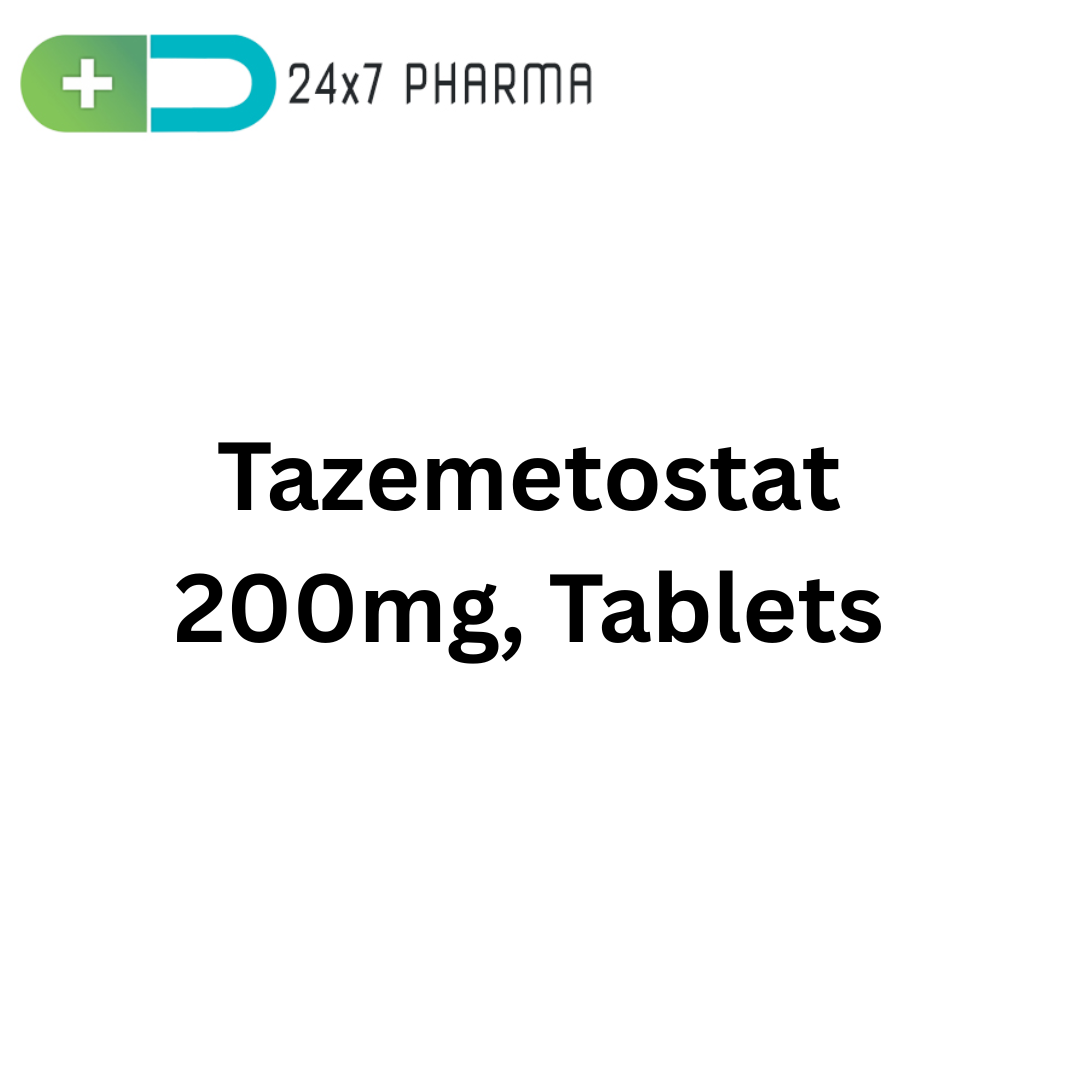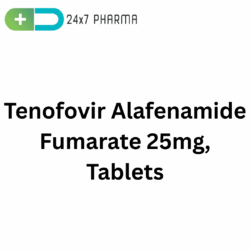LuciTaze 200mg, Tazemetostat Tablets
LuciTaze 200mg is a targeted anti-cancer therapy containing the active ingredient Tazemetostat, an oral small-molecule inhibitor used in the treatment of certain cancers. Manufactured to act precisely on specific genetic mutations involved in cancer development, it is primarily used in patients with advanced or relapsed epithelioid sarcoma and follicular lymphoma. In the realm of epigenetic therapy, it is a major breakthrough.
What is LuciTaze 200mg (Tazemetostat)?
LuciTaze 200mg is a prescription medication that belongs to the class of EZH2 (Enhancer of Zeste Homolog 2) inhibitors. Tazemetostat, the active component, interferes with abnormal genetic activity driving the growth and survival of certain tumors. It is administered orally and is suitable for long-term outpatient treatment.
It is primarily approved for:
- Adults and pediatric patients ≥16 years with metastatic or locally advanced epithelioid sarcoma (ES)
- Adults with relapsed or refractory follicular lymphoma (FL) with specific EZH2 mutations or when no satisfactory alternative options exist.
How It Works / Mechanism of Action
Tazemetostat selectively inhibits the histone methyltransferase enzyme EZH2. EZH2 is part of the polycomb repressive complex 2 (PRC2) that regulates gene expression by modifying chromatin structure through the trimethylation of histone H3 at lysine 27 (H3K27me3).
In many cancers, mutated or overactive EZH2 leads to gene silencing that promotes tumor cell proliferation and inhibits apoptosis. By blocking EZH2 activity, Tazemetostat:
- Reverses gene silencing
- Reactivates tumor suppressor genes
- Inhibits cancer cell growth
- Promotes programmed cell death (apoptosis)
- This targeted mechanism makes it especially beneficial for tumors with EZH2 mutations or epigenetic dysregulation.
How to Use / Indications
LuciTaze 200mg is indicated for use in:
- Epithelioid Sarcoma: For patients aged ≥16 years with metastatic or locally advanced ES not amenable to curative surgery.
- Follicular Lymphoma: For adult patients whose tumors have EZH2 mutations and have received at least two prior systemic therapies.
- Also used for EZH2 wild-type FL when no satisfactory alternative treatments exist.
- Its use should be based on a confirmed diagnosis with EZH2 mutation testing where required.
How to Take / Dosage
Recommended Dosage:
- LuciTaze 200mg is taken orally at a dose of 800 mg twice daily (i.e., four 200 mg tablets twice a day).
- Tablets should be swallowed whole with or without food.
- Treatment continues until disease progression or unacceptable toxicity.
Other Dosage Considerations
Dose adjustments may be necessary in case of:
- Hepatic or renal impairment
- Adverse reactions (e.g., hematologic toxicity)
- Co-administration with strong CYP3A inhibitors or inducers
- Pediatric use is approved only for patients aged 16 years and above in specific cancers. Its use in younger pediatric populations remains under investigation.
Side Effects
Like all cancer treatments, LuciTaze may cause side effects. Common and serious adverse effects include:
Common Side Effects:
- Fatigue
- Nausea
- Loss of appetite
- Vomiting
- Constipation
- Muscle pain
- Cough
- Abdominal pain
Hematologic Toxicities:
- Thrombocytopenia (low platelets)
- Anemia
- Neutropenia
Serious Adverse Effects:
- Secondary malignancies (e.g., myelodysplastic syndrome, acute myeloid leukemia)
- Severe liver enzyme elevations
- Infections due to immune suppression
- Regular blood tests are recommended to monitor for toxicities during treatment.
Storage
- Store below 30°C (86°F) in a dry place.
- Keep in the original container with the cap tightly closed.
- Protect from light and moisture.
- Keep out of reach of children.
- Do not use if the tablets are damaged or expired.
Benefits
LuciTaze 200mg provides several unique benefits:
- Targeted therapy: Focuses on specific epigenetic drivers like EZH2 mutations.
- Oral administration: Convenient for patients compared to IV chemotherapy.
- Non-cytotoxic mechanism: Offers a gentler treatment approach than traditional chemotherapy.
- Long-term control: Shows promising progression-free survival in eligible patients.
- Option for rare cancers: One of the few approved drugs for epithelioid sarcoma.
Prescription
LuciTaze 200mg is a prescription-only medication, and its use should be supervised by an oncologist or hematologist. It requires:
- Genetic testing to confirm EZH2 mutation status (especially in follicular lymphoma)
- Routine blood tests and clinical monitoring
- Consent that is informe, education of potential adverse effects, and compliance
Drug Interactions
Tazemetostat is primarily metabolized by the CYP3A enzyme. Thus, interactions can occur with:
Strong CYP3A Inhibitors:
- Ketoconazole, Itraconazole, Ritonavir
- May increase Tazemetostat levels and toxicity risk.
Strong CYP3A Inducers:
- Rifampin, Carbamazepine, Phenytoin
- May decrease drug effectiveness by lowering plasma levels.
Other Considerations:
- Avoid grapefruit or grapefruit juice.
- Use caution with anticoagulants or other myelosuppressive agents.
- Patients should inform their doctor about all prescription, over-the-counter, and herbal medicines they are taking.
FAQs
How long does treatment last?
Treatment continues as long as there is clinical benefit and tolerability.
Is LuciTaze chemotherapy?
No, it is a targeted epigenetic therapy.
What cancers does it treat?
Epithelioid sarcoma and follicular lymphoma.
Is genetic testing required before using LuciTaze?
Yes, especially for follicular lymphoma to detect EZH2 mutations.
Conclusion
LuciTaze 200mg (Tazemetostat) represents a significant milestone in epigenetic cancer therapy, offering a targeted approach to managing difficult-to-treat tumors like epithelioid sarcoma and relapsed follicular lymphoma. Its mechanism as an EZH2 inhibitor disrupts tumor growth while generally maintaining a manageable side-effect profile. As a convenient oral therapy, it enhances patient adherence and quality of life. For eligible patients, it offers a powerful tool in the fight against advanced cancers.



